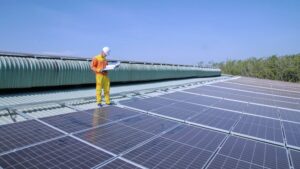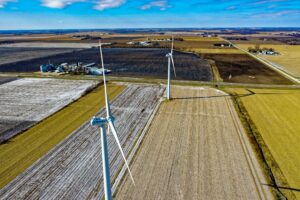The 2nd Scope 3 Emission Reduction Summit was held on April 18-19, 2024 in Berlin, Germany. Leaders in the industry, specialists, and decision-makers convened for this event. They discussed the difficult task of lowering Scope 3 emissions. Scope 3 emissions account for a substantial amount of a company’s carbon footprint. As a result, it is essential to meet net-zero targets and comply with evolving environmental regulations.
The two-day event featured educational keynotes, panel discussions, and case studies. We shall discuss the sessions and sponsors in-depth in this article. So, let’s dive in.

Sessions At The 2nd Scope 3 Emission Reduction Summit
The two-day 2nd Scope 3 Emission Reduction summit featured a comprehensive agenda with informative sessions led by industry experts and thought leaders. So, let’s take a look:
1. Taking Control of Scope 3 Emissions in a Changing World
Session Speaker: Sophie Punte, Founder and Board member, Smart Freight Centre
The significance of managing scope 3 emissions in light of evolving regulations was explored by Sophie Punte of Smart Freight Centre. She emphasized the increasingly stringent rules and guidelines about ESG and Scope 3. Moreover, she looked at how businesses react throughout their value chains. The speaker also underlined the importance of stakeholder involvement and teamwork in the advancement of decarbonization initiatives.
2. Transforming the Value-Chain for a Net-zero Transition
Session Speaker: Nicolas Clerget, Global Director Net Zero Strategy, The HEINEKEN Company
Nicolas Clerget shared Heineken’s journey towards achieving net-zero emissions by 2040. He emphasized the need for access to technology in the 2nd Scope 3 Emission Reduction Summit. The speaker also emphasized on a comprehensive transformation of the organization and its value chain. Furthermore, he discussed Heineken’s initiatives over the past three years. It includes setting up proper governance structures within the organization, upskilling employees & suppliers, and also implementing various other measures. As a result, it helps to support their net-zero transition.
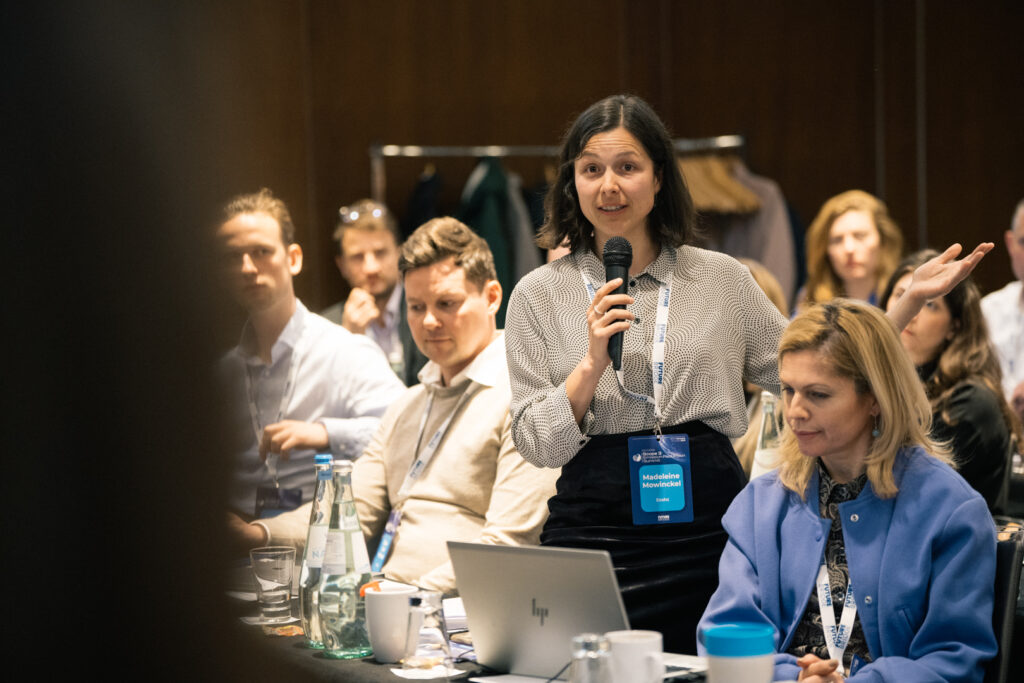
3. Sustainability Strategy Development, Risk Management, and Compliance with Evolving Regulations
Vendor Session
Planning for sustainability, controlling risks, and making sure laws are followed were the main topics of discussion during this vendor session. Moreover, the topics that were included were:
– Negotiating sustainability standards and laws,
– Establishing realistic decarbonization scenarios and objectives,
– Monitoring and assessing the decarbonization process,
– And managing risks connected to the environment and climate change
The goal of the seminar was to give participants knowledge and techniques for handling these important facets of sustainability management.
4. Procurement’s Critical Role in Reducing Upstream Scope 3 Emissions
Session Speaker: Dr. Verena Buback, Head of Procurement Excellence and Sustainability, Merck
Dr. Verena Buback from Merck highlighted the critical role of procurement in reducing upstream scope 3 emissions. She presented a case study on Merck’s supplier decarbonization program. Moreover, the emphasis was on the importance of collaboration within the company and across the industry. Furthermore, the speaker stressed the need to prioritize action over perfect data quality. So, it is crucial as companies strive to address scope 3 emissions effectively.
5. Methods for Collecting Category 1 Scope 3 Data
Session Speakers: Dr. Martin Bleider, Head of Sustainable Procurement, SCHOTT And
Nils Drescher, Jr Manager Sustainable Procurement, SCHOTT
Dr. Martin Bleider and Nils Drescher from SCHOTT discussed various methods for collecting category 1 scope 3 data. Furthermore, they explored the challenges and opportunities associated with supplier-specific data collection. They also explored data sources based on material categories and their accuracy, streamlining data collection from different sources, and using hybrid calculation methods. It includes spend-based, mass-based, and also supplier-specific data.

6. RESERVED SESSION – Ecohz
Session Speaker: Madeleine Mowinckel, Net Zero Advisor, Ecohz
As the silver sponsor of the event, Ecohz had a reserved session led by Madeleine Mowinckel, Net Zero Advisor.
7. Assessment and Initiatives to Limit the Carbon Footprint in the Full Value Chain of a Volvo Truck
Session Speakers: Mia Edofsson, Global Sustainability Director, Volvo Trucks And
Mia Romare, Specialist Climate Reporting, Volvo Trucks
Mia Edofsson and Mia Romare from Volvo Trucks shared insights on assessing and limiting the carbon footprint across a truck’s full value chain. Additionally, they discussed:
- The assessment and analysis of the climate impact over a truck’s lifecycle,
- Insights on how sustainable materials, technologies,
- Sustainable behaviors influence the climate footprint,
- Energy efficiency considerations, and the importance of renewable fuels.
They also highlighted the role of industry partnerships in reducing scope 3 emissions.
8. Addressing Pain Points of Scope 3 Transportation: Holcim’s Learnings to Improve Data Accuracy and Truly Reduce the CO2 Footprint from its Outbound Logistics
Session Speaker: Eugenia Ceballos Hunziker, Group Head Sustainable Procurement and Impact Valuation, Holcim
Eugenia Ceballos Hunziker from Holcim presented a case study on addressing the pain points of scope 3 transportation and reducing the CO2 footprint from outbound logistics. Furthermore, she discussed selecting the starting model and actions. It improves data accuracy and also helps in reporting efficiency. As a result, it helps in delivering on the SBTi target and also helps customers reduce their scope 3 emissions.
9. Incorporating IoT Technology and Artificial Intelligence into End Products to Reduce Scope 3 Emissions
Vendor Session
This vendor session explored the potential of incorporating IoT technology and AI into end products to reduce scope 3 emissions. Furthermore, The session covered topics such as adapting products to usage patterns and automatic task scheduling to optimize energy efficiency.
10. Advanced Procurement Strategies to Incentivize Scope 3 Emissions
Session Speaker: Dr. Maximilian Zott, Subject Matter Expert for Carbon Incentives, TWS Partners (Presenting Partner)
Dr. Maximilian Zott from TWS Partners, the presenting partner, discussed advanced procurement strategies to incentivize scope 3 emissions reduction. Furthermore, he covered topics such as:
- Integrating scope 3 emissions into procurement practices,
- Optimizing procurement for scope 3 reduction,
- Developing internal scope 3 strategies,
- And incentivizing suppliers to reduce scope 3 emissions.
11. Establishing Targeted Industry Partnership to Address Scope 3 Emissions
Discussion Panelists: Britta Gallus – Head of Climate & Carbon at Metro, Dr. Verena Buback – Head of Procurement Excellence and Sustainability at Merck, Nicolas Clerget – Global Director Net Zero Strategy at The HEINEKEN Company, Mia Edofsson – Global Sustainability Director at Volvo Trucks
The discussion explored the importance of collaboration and knowledge-sharing among industry players to tackle the complex challenge of scope 3 emissions.
12. Scope 3 Management Needs a Systemic Vision of Climate and Just Transition
Session Speaker: Eliza Mahdavy-Turcat, CSR Director, Enedis
Eliza Mahdavy-Turcat from Enedis emphasized the need for a systemic vision of climate and just transition in scope 3 management. Moreover, she discussed challenges such as onboarding suppliers creating collaboration, and dealing with small and medium-sized companies in the value chain. She also discussed the limitations of monetary factors when real data is missing.
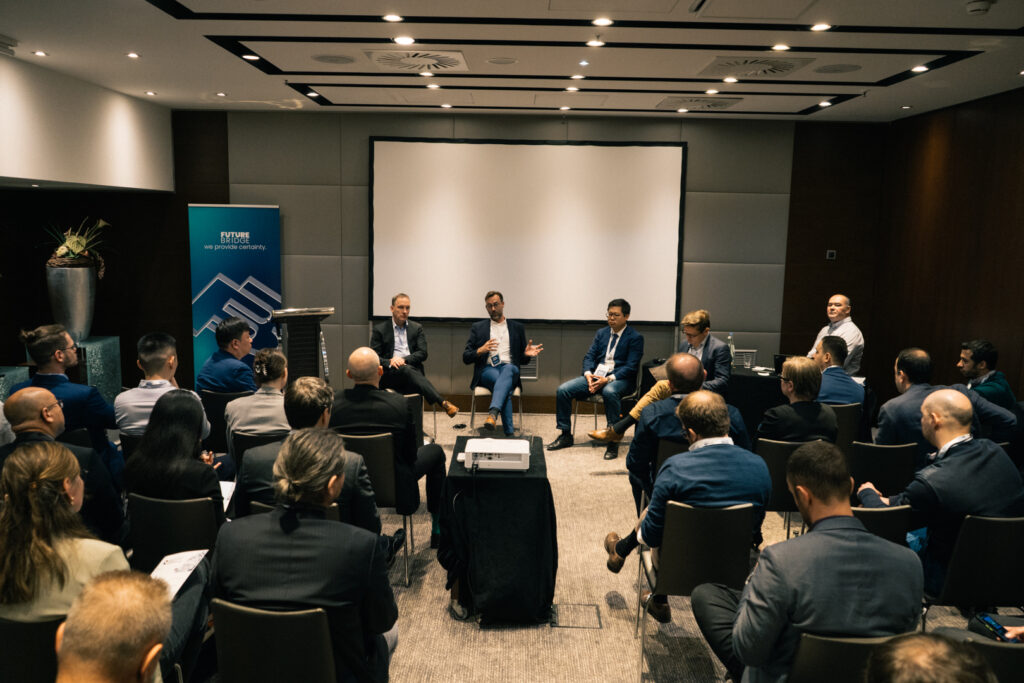
13. From Disclosure to Action: Gaps and Opportunities in Scope 3 and Renewable Energy
Session Speaker: Laura Hohmann, Associate Director, Sustainable Supply Chains, CDP
Laura Hohmann from CDP highlighted gaps and opportunities in scope 3 and renewable energy disclosure and action. Furthermore, she explored the challenges and potential solutions to move from mere disclosure to tangible actions. This is in addressing scope 3 emissions and also promoting renewable energy adoption.
14. Automated Scope 3 Reporting Solutions
Vendor Session
This vendor session focused on automated scope 3 reporting solutions. The session in the 2nd Scope 3 Emission Reduction Summit covered topics such as:
- Automating data collection,
- Streamlining sustainability disclosures,
- Real-time data monitoring and analytics,
- Data integration, and interoperability.
15. Engaging Consumers on Our Sustainable Journey
Session Speaker: Vanessa Harrer, Senior Director Sustainability Europe, Mondelēz International
Vanessa Harrer from Mondelēz International presented a case study on engaging consumers in their sustainable journey. She discussed the company’s Harmony Ambition 2030 initiative. It involves working with local farmers and partnerships across Europe. This is to create an environment where wheat for their biscuits is grown in thriving and also biodiverse environments. Harrer also shared insights on involving consumers in initiatives. It protects wild bees through its Local Heritage Brands.
16. The Whirlpool Ecoplayer Platform
Session Speaker: Filippo De Nittis, Head of EMEA Marketing & Group IOT & Sustainability Strategy, Whirlpool
Filippo De Nittis from Whirlpool introduced the Ecoplayer Platform. It aims to enable people to easily embed eco-sustainability into their daily routines. This is through activations, tools, devices, and also partnerships.
17. Engaging with Suppliers to Reduce Upstream Scope 3 Emissions
Session Speaker: Arda Isildar, Senior Manager Supplier Sustainability, Global Operations Procurement, Supplier Sustainability, TE Connectivity
Arda Isildar from TE Connectivity discussed strategies for engaging with suppliers to reduce upstream scope 3 emissions. Furthermore, the speaker highlighted the importance of partnering with suppliers. It decreases their operational emissions, guides suppliers to achieve efficient and also sustainable operations. Additionally, Arda discussed leveraging TE BEST expertise and sharing case studies with business partners.
18. How Your Purchase Team Will Save the Climate
Session Speaker: Nicolas Endress, CEO & Founder, ClimEase (Bronze Sponsor)
Nicolas Endress from ClimEase, the bronze sponsor, presented a session titled “How Your Purchase Team Will Save the Climate.” He discussed the need for a global carbon tax. He also explained why the Carbon Border Adjustment Mechanism (CBAM) is the last piece of the green policy puzzle. Furthermore, the speaker introduced ClimEase and their vision. He highlighted how procurement teams can play a crucial role in driving climate action and also achieving decarbonization goals.
19. Shipbuilding Insights on Product Design and Downstream Scope 3 Emission Reduction
Session Speaker: Wassim Daoud, Head of CSR and Sustainability, Ponant
Wassim Daoud from Ponant shared shipbuilding insights on product design and downstream scope 3 emission reduction. Moreover, he covered topics such as:
- Lifecycle assessment integration and analysis of environmental impact,
- Incorporating sustainable materials and technologies,
- Designing for energy efficiency and extended product lifespan,
- And exploring product upgradability.
The session aimed to provide strategies for reducing scope 3 emissions through product design and also innovation in the shipbuilding industry.
20. Renault’s Case Study on Scope 3 Considerations in Materials Use for New Vehicles
Session Speaker: Francois Farion, Design Director, Innovation, C&M Process & Sustainability, Renault Group
Francois Farion from Renault Group presented a case study on scope 3 considerations in materials use for new vehicles. He discussed navigating the regulatory landscape, cost dynamics in material applications, technological performance considerations, and the human factor involved in internal change and convincing customers. Furthermore, the session provided insights into Renault’s approach to addressing scope 3 emissions through sustainable material choices and product design.
21. Blockchain & Tagging Technology for the Value Chain
Vendor Session
The purpose of this vendor session in the 2nd Scope 3 Emission Reduction Summit was to discuss how blockchain and tagging technologies can enhance value chain traceability and transparency. Furthermore, the topics discussed in the session were:
– Assuring traceability of carbon-related information,
– Boosting the dependability of scope 3 reporting,
– Adopting blockchain for secure emissions data recording,
– And promoting transparency in the value chain
A thorough grasp of the difficulties, approaches, and creative solutions to Scope 3 emissions management was given to participants of the 2nd Scope 3 Emission Reduction Summit through these varied sessions. So, let’s now proceed to look at the event sponsors.
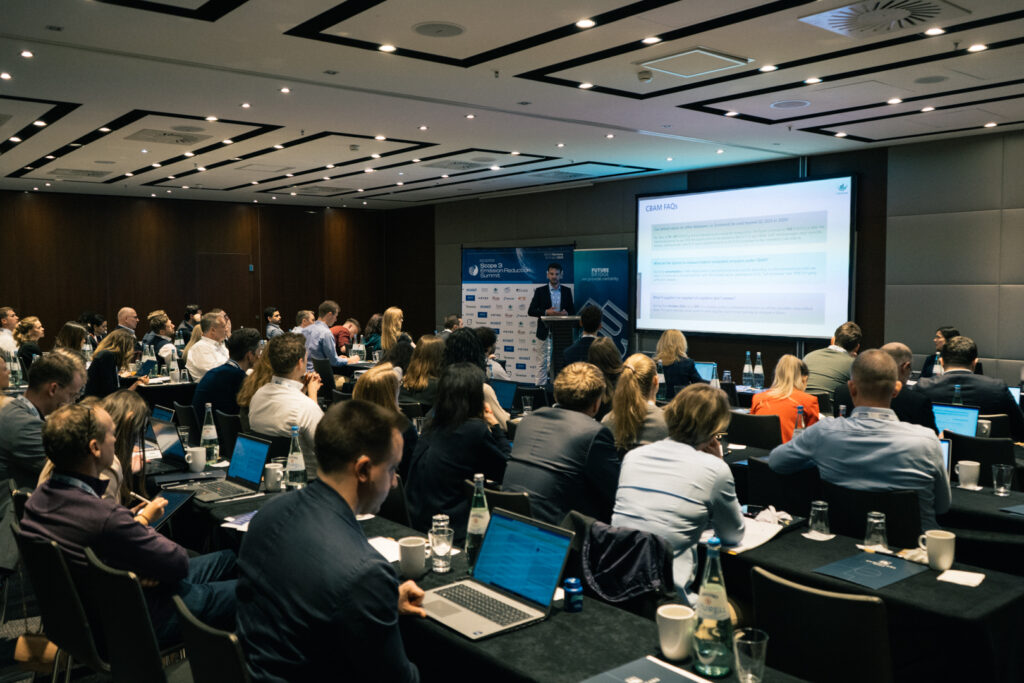
2nd Scope 3 Emission Reduction Summit: Sponsors
The 2nd Scope 3 Emission Reduction Summit was made possible with the support of industry-leading sponsors who are at the forefront of driving sustainability and decarbonization efforts.
Ecohz – Silver Sponsor
Ecohz served as the Silver Sponsor of the event. With their wealth of experience, Ecohz helps companies build net-zero supply chains by tailoring sustainability solutions. Furthermore, their comprehensive toolbox includes documented renewable energy, carbon credits, biogas, and Scope 3 digital platforms. Beyond providing tools, Ecohz offers a unique blend of expertise, guiding companies every step of the way. Their mission is to simplify the path to net zero, driven by the belief that simplicity enables urgent climate action – and that what is good for the planet is also good for business.
ClimEase – Bronze Sponsor
ClimEase, the Bronze Sponsor, envisions a world of frictionless Carbon Border Adjustment Mechanism (CBAM) compliance and active supply chain decarbonization, all through a single tool. They aim to leverage the mandatory nature of CBAM to automate compliant supplier emission surveying. It is also to invite international manufacturers to join the world’s first Green Supplier Database. This initiative gives green producers more visibility and enables manufacturing importers’ procurement departments. This is to easily switch to greener suppliers. Moreover, ClimEase’s financial layer translates a carbon footprint into a forward-looking carbon tax exposure. So, it offers complete financial transparency on long-term supplier contracts. As a result, it provides clear fiscal insights and actively contributes to the decarbonization of the world’s most emission-intensive sectors.
TWS Partners – Presenting Partner
TWS Partners, the Presenting Partner, is a leading economic strategy consultancy with over 100 game theory experts across locations in Munich, London, Berlin, Utrecht, and Zurich. Moreover, their award-winning methodology enables companies to make strategic business decisions with the highest level of certainty. With its economic toolbox, TWS Partners offers effective strategies and support to achieve net-zero emission goals and contribute to organizations’ ESG strategies. So, by having TWS experts on their side, companies can become true value drivers. They can also deliver unparalleled results in their sustainability efforts.
These sponsors played a crucial role in supporting the 2nd Scope 3 Emission Reduction Summit, contributing their expertise, solutions, and resources. This is to drive meaningful discussions and also foster collaboration towards a more sustainable future.
To Sum Up
As companies strive to achieve their net-zero targets and comply with evolving regulations, events like the 2nd Scope 3 Emission Reduction Summit are crucial for driving progress. Furthermore, staying informed, networking with experts, and implementing best practices shared at these gatherings will be vital for organizations to successfully navigate the transition toward a sustainable, low-carbon future. So, take action today to secure your spot at the next must-attend event!


